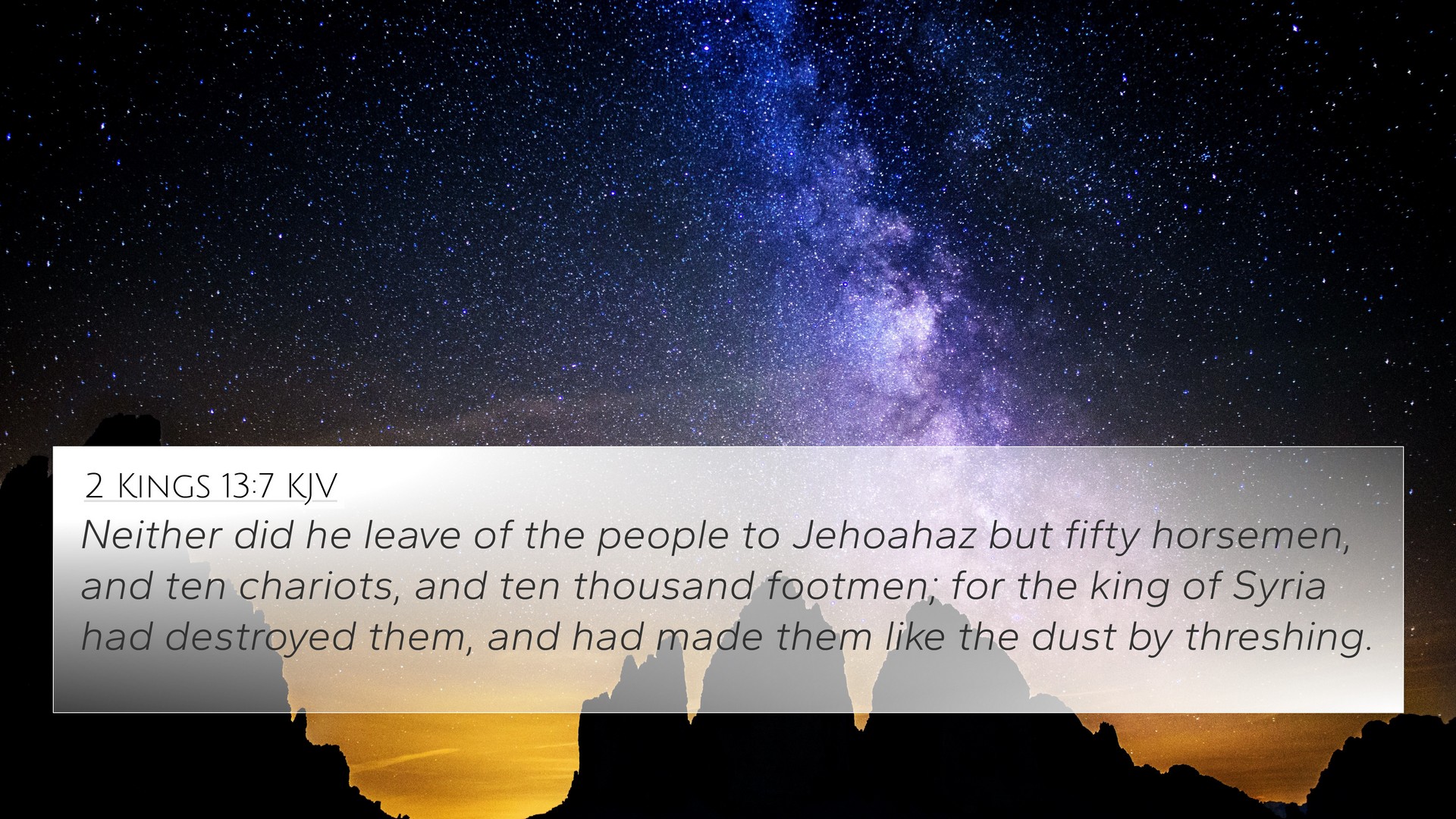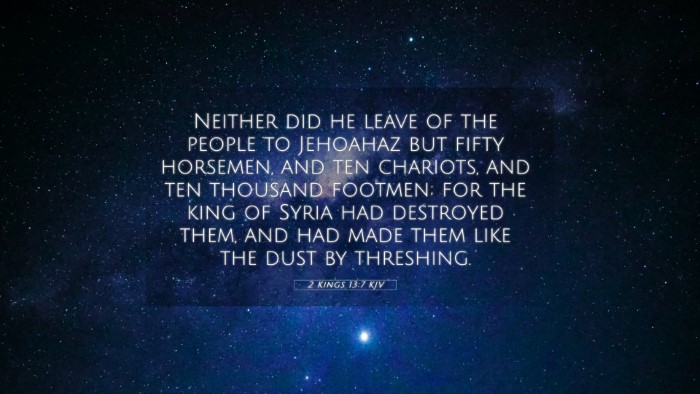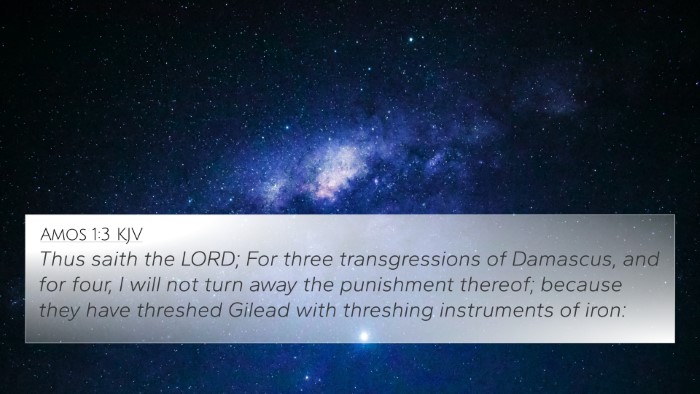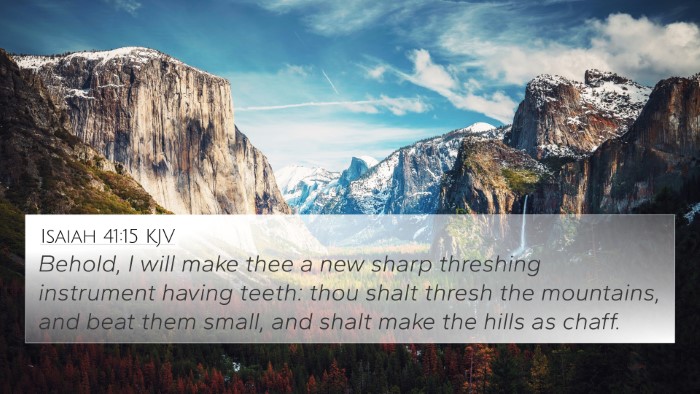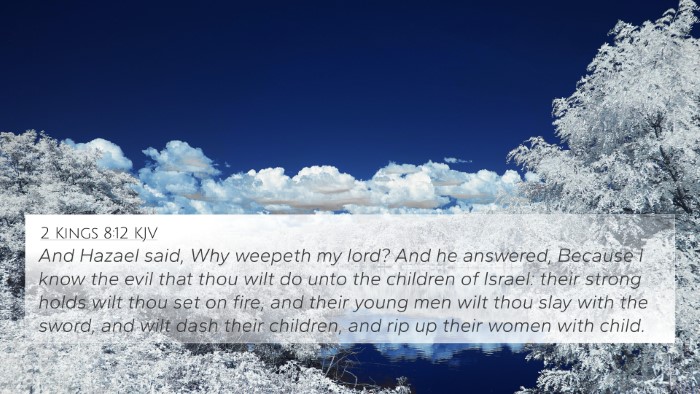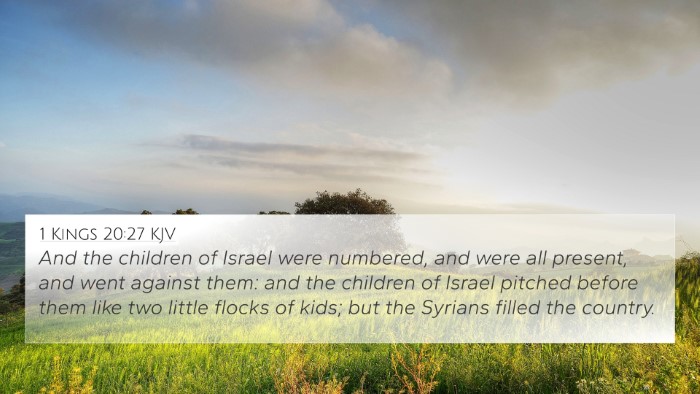Understanding 2 Kings 13:7
Bible Verse: 2 Kings 13:7 - "For he left of the people to Jehoahaz but fifty horsemen, and ten chariots, and a thousand footmen: for the king of Syria had destroyed them, and had made them like the dust by threshing."
Summary and Insights
This verse reflects the dire military situation of Israel during the reign of Jehoahaz. The commentary from various scholars sheds light on its meaning and implications.
Matthew Henry’s Commentary
According to Matthew Henry, this verse illustrates the severity of Israel's defeat at the hands of the Syrians. The meager numbers of troops left indicate a nation that has been decimated by warfare. Henry emphasizes the spiritual implications of this military decline, linking it to Israel’s unfaithfulness to God which led to their vulnerability.
Albert Barnes’ Notes
Albert Barnes notes that the specific numbers mentioned — fifty horsemen, ten chariots, and one thousand footmen — emphasize the tragic reduction of Israel's military power. Such a small force signifies not only a loss in physical strength but also a loss of national pride. He connects this defeat to previous actions of Israel’s kings, suggesting a history of unfaithfulness and idolatry that brought about divine judgment.
Adam Clarke’s Commentary
Adam Clarke focuses on the metaphorical aspects of being "made like the dust by threshing." Clarke explains that this phrase conveys total destruction and insignificance. He notes that the remnants left could symbolize hope; even with so few, there remains a possibility for revival.
Moreover, Clarke posits that the condition of Israel at this moment serves as a warning to future generations about the consequences of abandoning God's covenant.
Thematic Connections
2 Kings 13:7 serves as a reminder of the importance of faithfulness to God. The desolation portrayed here leads to deeper reflections on Israel's covenant relationship with God, one that has significant ramifications throughout both the Old and New Testaments. Below are thematic connections and cross-references from the Scriptures that relate to this verse:
- Deuteronomy 28:25 - Discusses curses for disobedience, highlighting Israel's vulnerability.
- 2 Kings 10:32-33 - Provides context on how Israel's enemies, specifically the Syrians, gained power over them due to Israel's sins.
- Isaiah 7:8 - Delivers a prophecy regarding the decline of Israel, which is evident in Jehoahaz’s reign.
- Jeremiah 5:15 - Sees a foreign nation rising against Israel for their unfaithfulness.
- Psalm 44:11-12 - Expresses feelings of defeat and God's involvement in Israel's military struggles.
- 1 Peter 5:8 - A reminder of being vigilant in faith, paralleling Israel’s loss of military vigilance.
- Hebrews 12:6 - Reflects on the idea of discipline as a form of love from God, linking the troubles faced by Israel to God's corrective actions.
Comparative Analysis
By conducting a comparative Bible verse analysis, readers can deeply understand why Israel fell to such lows. The link between 2 Kings 13:7 and other Scriptural references illuminates key themes like judgment, military defeat, and the importance of fidelity to God.
Tools for Cross-Referencing
To explore these connections further, consider using various Bible cross-reference tools:
- Bible Concordance - Helps locate verses related to specific terms or themes.
- Bible Cross-Reference Guide - Provides a structured approach to finding interconnected scriptures.
- Comprehensive Bible Cross-Reference Materials - Lists extensive references for in-depth study.
Conclusion
In summary, 2 Kings 13:7 not only describes the military state of Israel but serves as a cautionary tale regarding faithlessness. The inter-Biblical dialogue seen in cross-referencing allows for a richer understanding of the text's implications. By examining the themes of divine judgment, military vulnerability, and the enduring need for faithfulness throughout Scripture, we can glean vital lessons for spiritual introspection and behavior.
FAQs
What verses are related to 2 Kings 13:7?
Related verses include Deuteronomy 28:25, 2 Kings 10:32-33, Isaiah 7:8, and others mentioned earlier in the text.
How do 2 Kings 13:7 and Jeremiah 5:15 connect?
Both verses discuss the consequences of unfaithfulness to God and the rise of foreign powers against Israel as a result of their sinfulness.
